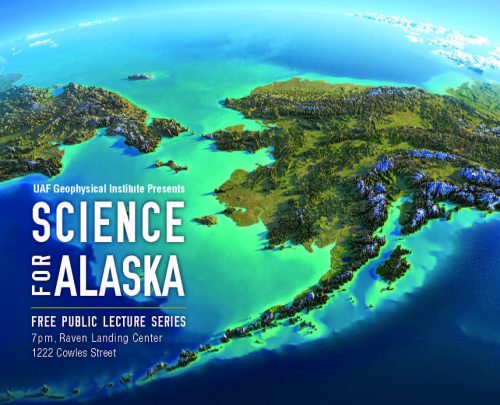28th annual Science for Alaska Lecture Series announced
January 22, 2020
Frederick Freudenberger
907-474-7185

The University of Alaska Fairbanks Geophysical Institute will host free public talks on topics ranging from the aurora to permafrost to the 2018 earthquake in Anchorage.
The 2020 Science for Alaska Lecture Series begins Tuesday, Jan. 28, and runs through March 3. Talks start at 7 p.m. every Tuesday at Raven Landing Center.
For 28 years, the Geophysical Institute has hosted the lecture series as one of its largest public outreach efforts.
The series brings current scientific research to Alaskans in an event that pools knowledge from scientists with expertise across the state.
Lectures are offered live in Fairbanks and online, as well as on DVDs that are accessible through the Alaska library system.
The 2020 lectures and dates are:
- Jan. 28: Sunny With a Chance of Space Storms, C. Alex Young, associate director for science, Heliophysics Division, NASA Goddard Space Flight Center
- Feb. 4: Nukes in Alaska: Then and Now, Curt Szuberla, director of the Wilson Alaska Technical Center
- Feb. 11: Not-So-Permanent Permafrost?, Louise Farquharson, research associate, UAF
- Feb. 18: How to Talk to a Satellite, Denise Thorsen, professor of electrical and computer engineering, UAF
- Feb. 25: Alaska Aftershocks: The 2018 Anchorage Earthquake, Matt Gardine, seismologist, Alaska Earthquake Center, UAF
- March 3: Aurorasaurus: How You Can Get Involved in Aurora Research, Elizabeth MacDonald, space physicist, NASA Goddard Space Flight Center
For more about the lectures, please visit the series website or the Facebook event page.
Download a flyer here .
The 2020 Science for Alaska Lecture Series is sponsored by the Triplehorn family, Lifewater Engineering and Class 5 Boatworks, the Alaska Established Program to Stimulate Competitive Research, the NASA Space Science Education Consortium, and the Geophysical Institute.


